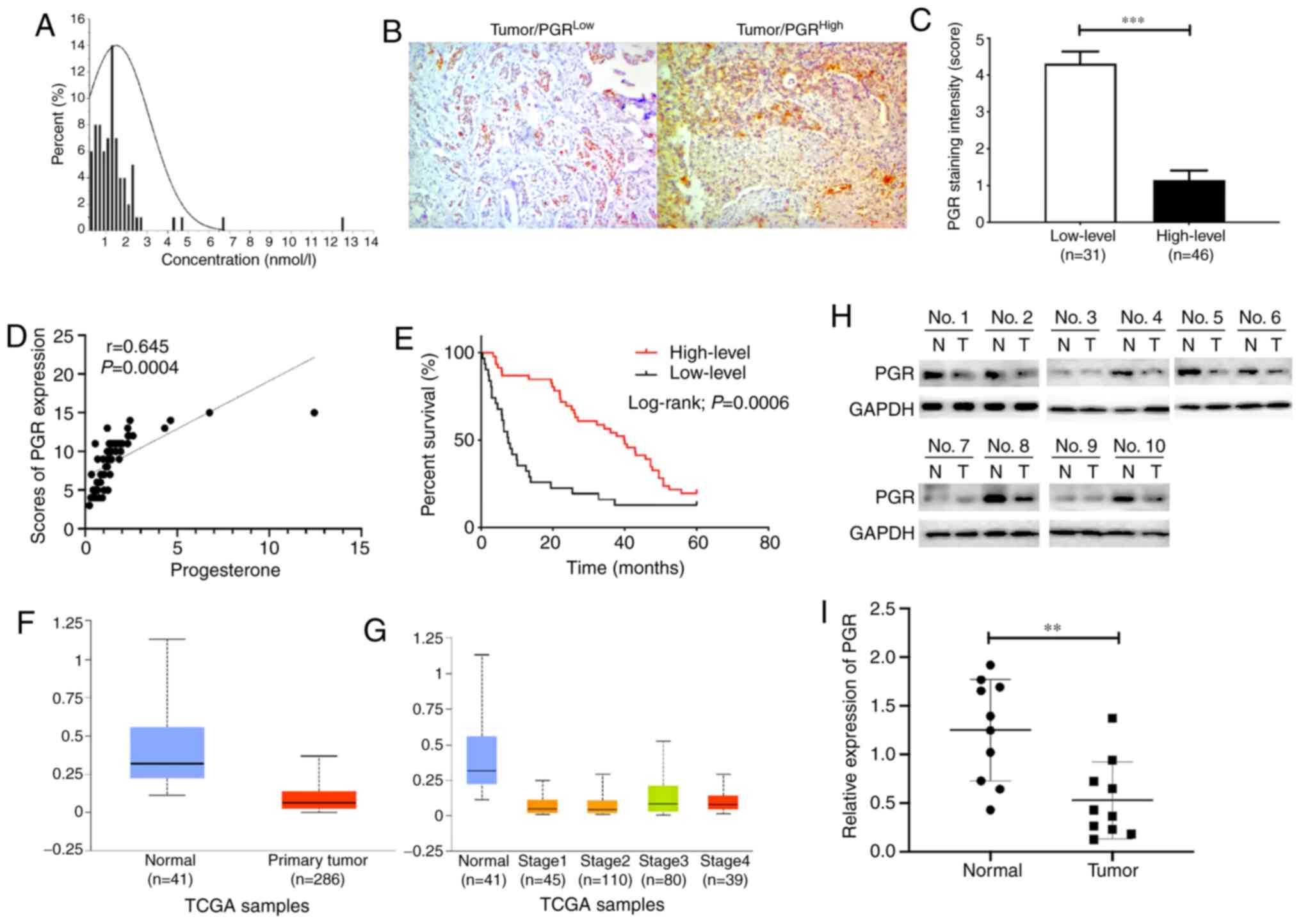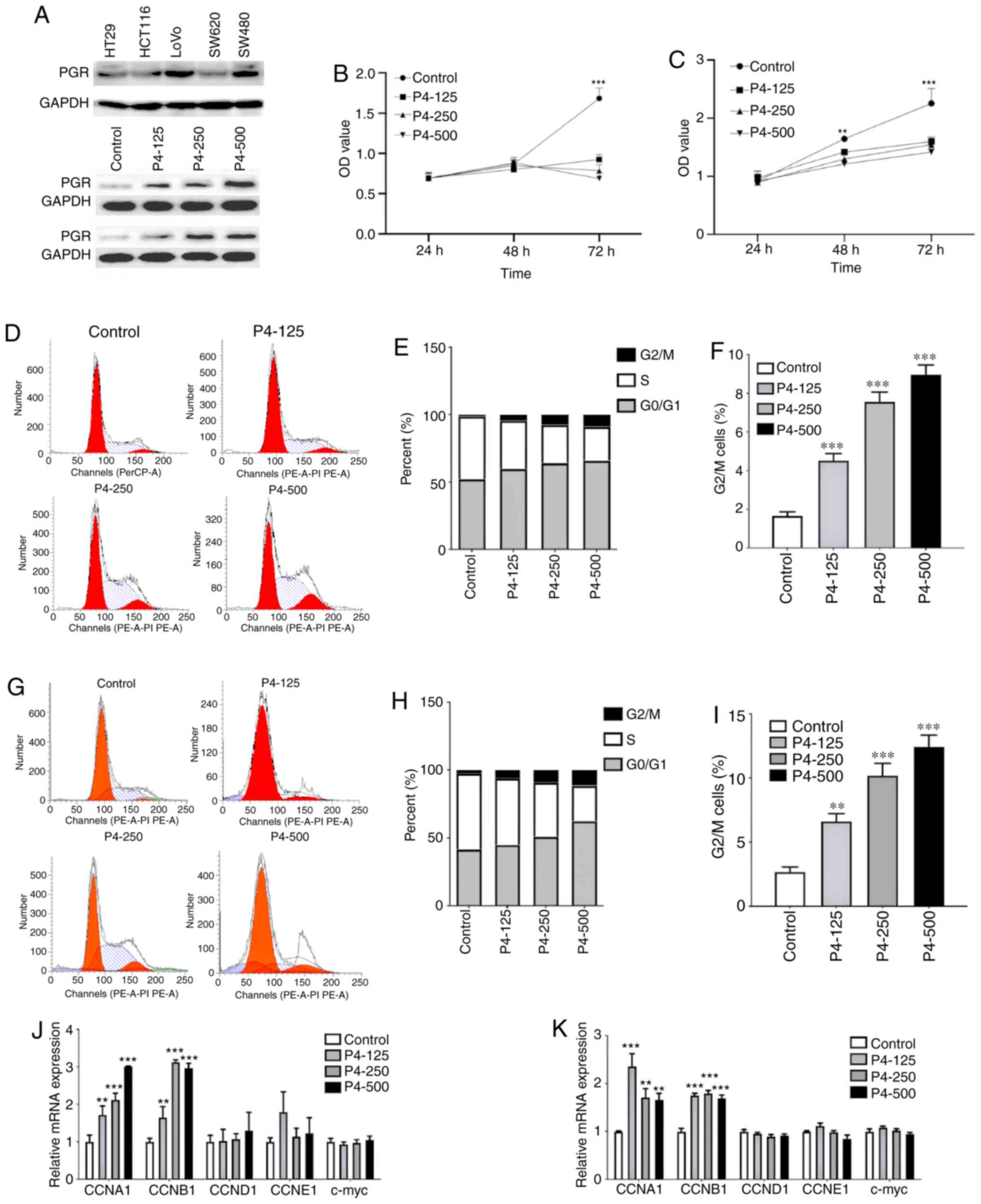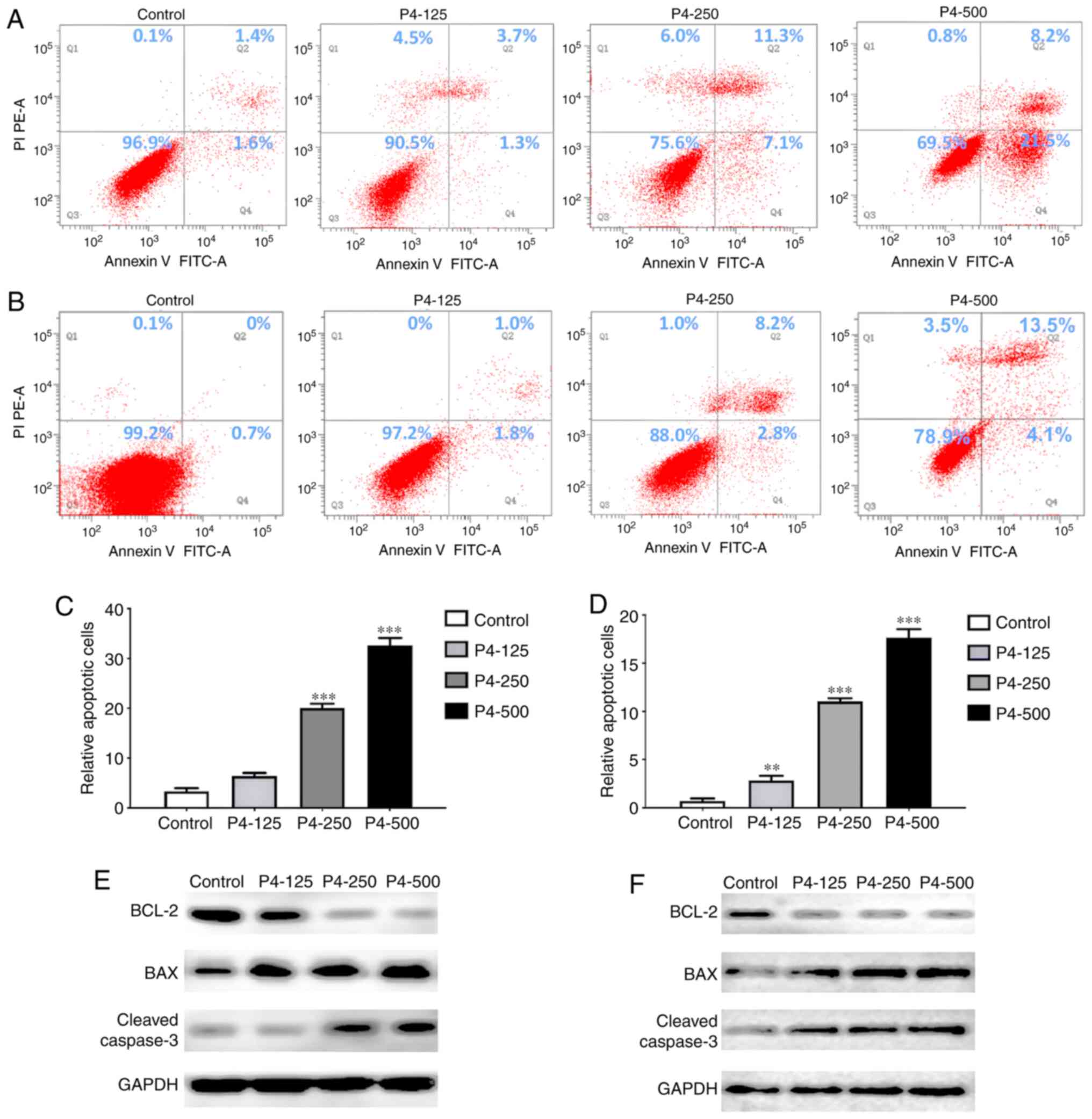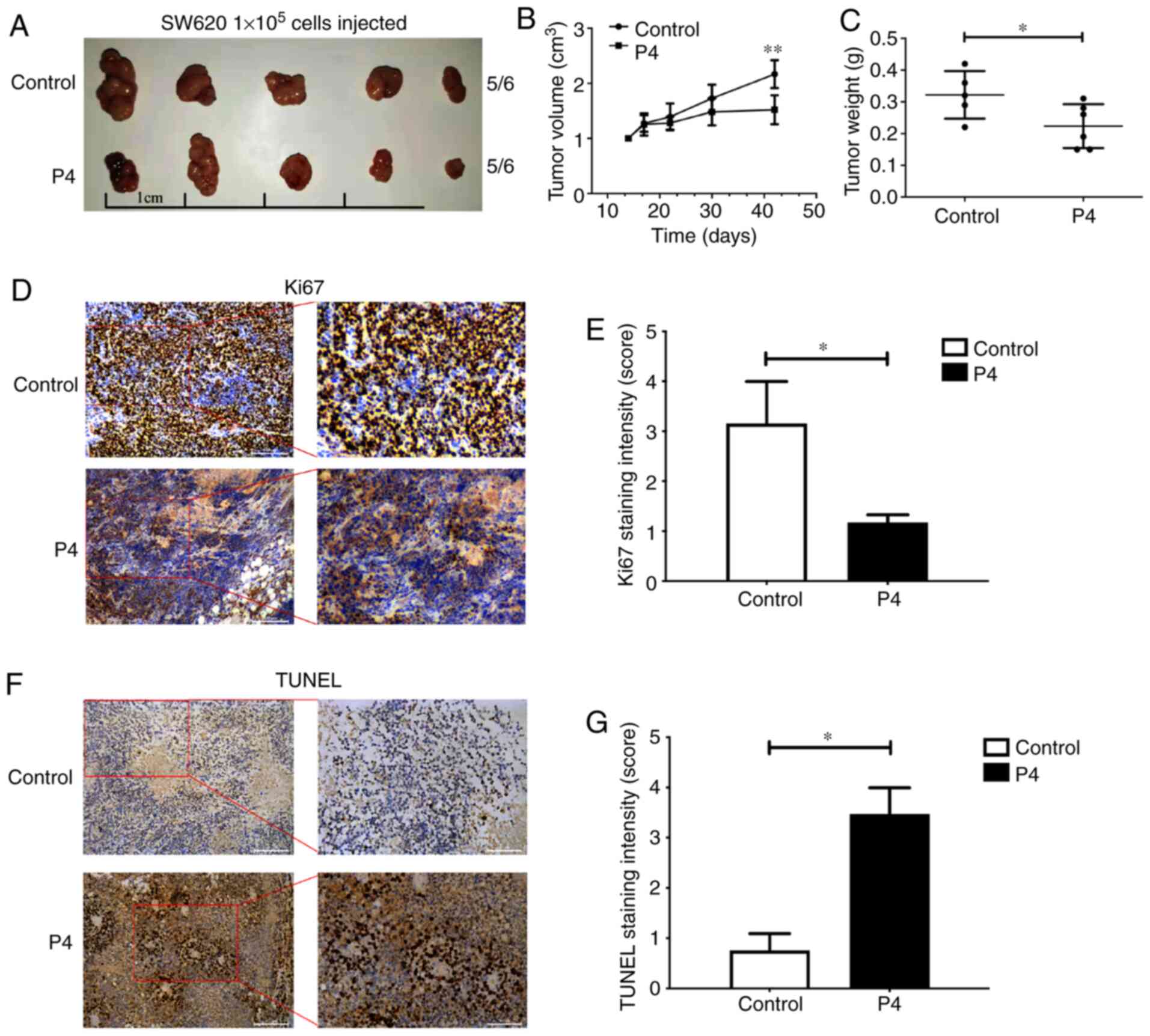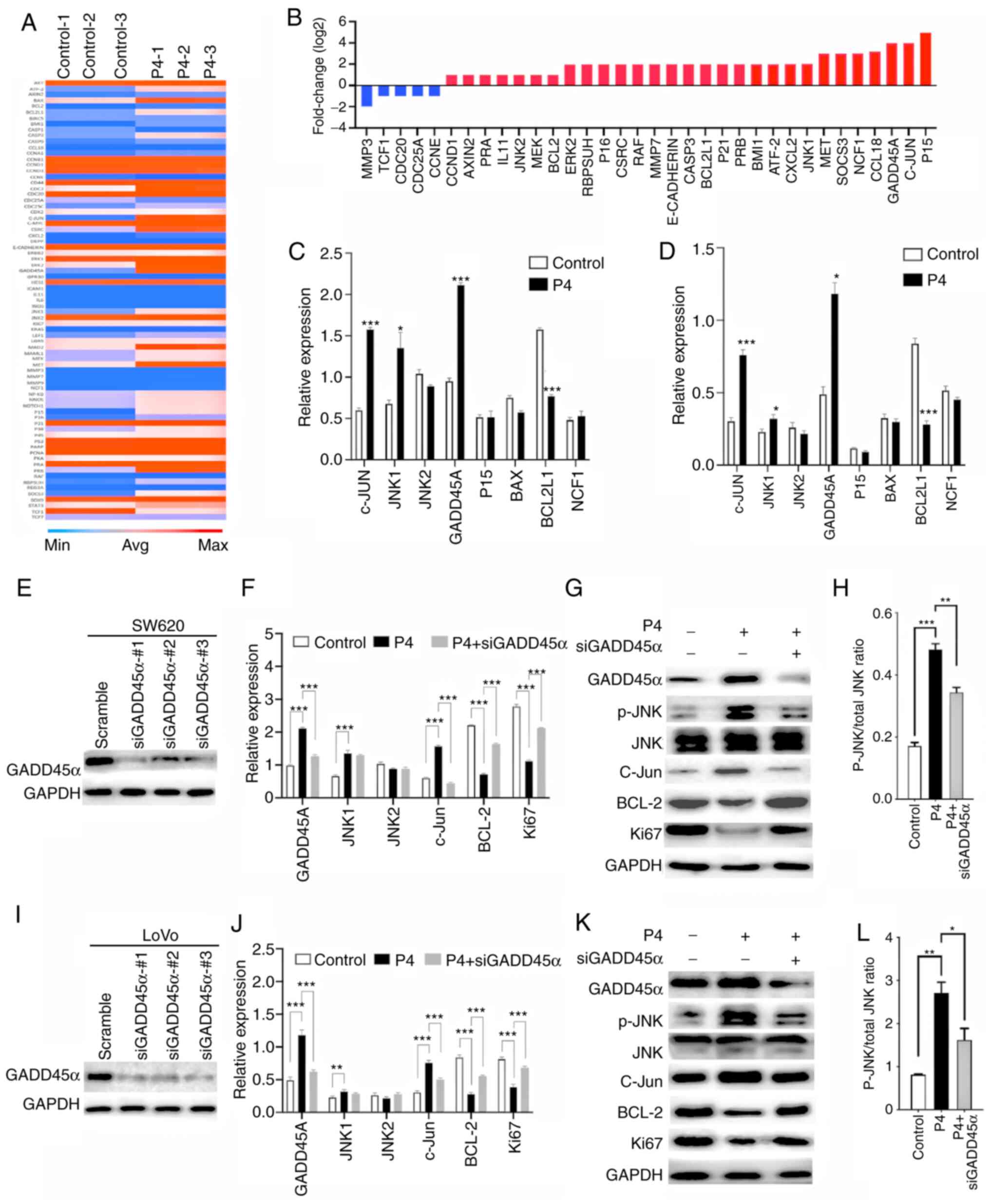|
1
|
Sung H, Ferlay J, Siegel RL, Laversanne M,
Soerjomataram I, Jemal A and Bray F: Global cancer statistics 2020:
GLOBOCAN estimates of incidence and mortality worldwide for 36
cancers in 185 countries. CA Cancer J Clin. Feb 4–2021.(Epub ahead
of print). View Article : Google Scholar : PubMed/NCBI
|
|
2
|
Dekker E, Tanis P, Vleugels JLA, Kasi PM
and Wallace MB: Colorectal cancer. Lancet. 394:1467–1480. 2019.
View Article : Google Scholar : PubMed/NCBI
|
|
3
|
Folkerd EJ and Dowsett M: Influence of sex
hormones on cancer progression. J Clin Oncol. 28:4038–4044. 2010.
View Article : Google Scholar : PubMed/NCBI
|
|
4
|
Fonseca EB, Celik E, Parra M, Singh M and
Nicolaides KH; Fetal Medicine Foundation Second Trimester Screening
Group, : Progesterone and the risk of preterm birth among women
with a short cervix. N Engl J Med. 357:462–469. 2007. View Article : Google Scholar : PubMed/NCBI
|
|
5
|
Tsai HW, Ho CL, Cheng SW, Lin YJ, Chen CC,
Cheng PN, Yen CJ, Chang TT, Chiang PM, Chan SH, et al: Progesterone
receptor membrane component 1 as a potential prognostic biomarker
for hepatocellular carcinoma. World J Gastroenterol. 24:1152–1166.
2018. View Article : Google Scholar : PubMed/NCBI
|
|
6
|
Syed V, Mukherjee K, Lyons-Weiler J, Lau
KM, Mashima T, Tsuruo T and Ho SM: Identification of ATF-3,
caveolin-1, DLC-1, and NM23-H2 as putative antitumorigenic,
progesterone-regulated genes for ovarian cancer cells by gene
profiling. Oncogene. 24:1774–1787. 2005. View Article : Google Scholar : PubMed/NCBI
|
|
7
|
Kim HW, Kim JH, Lim BJ, Kim H, Kim H, Park
JJ, Youn YH, Park H, Noh SH, Kim JW and Choi SH: Sex disparity in
gastric cancer: Female sex is a poor prognostic factor for advanced
gastric cancer. Ann Surg Oncol. 23:4344–4351. 2016. View Article : Google Scholar : PubMed/NCBI
|
|
8
|
Aktas B, Kasimir-Bauer S, Müller V, Janni
W, Fehm T, Wallwiener D, Pantel K and Tewes M; DETECT Study Group,
: Comparison of the HER2, estrogen and progesterone receptor
expression profile of primary tumor, metastases and circulating
tumor cells in metastatic breast cancer patients. BMC Cancer.
16:5222016. View Article : Google Scholar : PubMed/NCBI
|
|
9
|
Núñez C, Capelo JL, Igrejas G, Alfonso A,
Botana LM and Lodeiro C: An overview of the effective combination
therapies for the treatment of breast cancer. Biomaterials.
97:34–50. 2016. View Article : Google Scholar
|
|
10
|
Kong X, Li M, Shao K, Yang Y, Wang Q and
Cai M: Progesterone induces cell apoptosis via the
CACNA2D3/Ca2+/p38 MAPK pathway in endometrial cancer. Oncol Rep.
43:121–132. 2020.PubMed/NCBI
|
|
11
|
Lin JH, Manson JE, Kraft P, Cochrane BB,
Gunter MJ, Chlebowski RT and Zhang SM: Estrogen and
progesterone-related gene variants and colorectal cancer risk in
women. BMC Med Genet. 12:782011. View Article : Google Scholar : PubMed/NCBI
|
|
12
|
Liu Y, Tian LB, Yang HY and Zhang HP:
Effects of estradiol and progesterone on the growth of HeLa
cervical cancer cells. Eur Rev Med Pharmacol Sci. 21:3959–3965.
2017.PubMed/NCBI
|
|
13
|
Park JY, Kim DY, Kim TJ, Kim JW, Kim JH,
Kim YM, Kim YT, Bae DS and Nam JH: Hormonal therapy for women with
stage IA endometrial cancer of all grades. Obstet Gynecol.
122:7–14. 2013. View Article : Google Scholar : PubMed/NCBI
|
|
14
|
Simon MS, Chlebowski RT, Wactawskiwende J,
Johnson KC, Muskovitz A, Kato I, Young A, Hubbell FA and Prentice
RL: Estrogen plus progestin and colorectal cancer incidence and
mortality. J Clin Oncol. 30:3983–3990. 2012. View Article : Google Scholar : PubMed/NCBI
|
|
15
|
Schürmann R, Cronin M and Meyer JU:
Estrogen plus progestin and colorectal cancer in postmenopausal
women. N Engl J Med. 350:2417–2419. 2004. View Article : Google Scholar
|
|
16
|
Kuo CT and Lee WS: Progesterone receptor
activation is required for folic acid-induced anti-proliferation in
colorectal cancer cell lines. Cancer Lett. 378:104–110. 2016.
View Article : Google Scholar : PubMed/NCBI
|
|
17
|
Motylewska E and Mełeń-Mucha G: Estrone
and progesterone inhibit the growth of murine MC38 colon cancer
line. J Steroid Biochem Mol Biol. 113:75–79. 2009. View Article : Google Scholar : PubMed/NCBI
|
|
18
|
Mauri G, Bonazzina E, Amatu A, Tosi F,
Bencardino K, Gori V, Massihnia D, Cipani T, Spina F, Ghezzi S, et
al: The evolutionary landscape of treatment for BRAF (V600E) mutant
metastatic colorectal cancer. Cancers (Basel). 13:1372021.
View Article : Google Scholar : PubMed/NCBI
|
|
19
|
Sui X, Kong N, Ye L, Han W, Zhou J, Zhang
Q, He C and Pan H: p38 and JNK MAPK pathways control the balance of
apoptosis and autophagy in response to chemotherapeutic agents.
Cancer Lett. 344:174–179. 2014. View Article : Google Scholar : PubMed/NCBI
|
|
20
|
Zhu X, Jiang X, Duan C, Li A, Sun Y, Qi Q,
Liu Y, Li S and Zhao Z: S-Allylmercaptocysteine induces G2/M phase
arrest and apoptosis via ROS-mediated p38 and JNK signaling pathway
in human colon cancer cells in vitro and in vivo. RSC Adv.
7:49151–49158. 2017. View Article : Google Scholar
|
|
21
|
Chen K, Chu BZ, Liu F, Li B, Gao CM, Li
LL, Sun QS, Shen ZF and Jiang YY: New benzimidazole acridine
derivative induces human colon cancer cell apoptosis in vitro via
the ROS-JNK signaling pathway. Acta Pharmacol Sin. 36:1074–1084.
2015. View Article : Google Scholar : PubMed/NCBI
|
|
22
|
Zhou WJ, Hou XX, Wang XQ and Li DJ:
Fibroblast growth factor 7 regulates proliferation and
decidualization of human endometrial stromal cells via ERK and JNK
pathway in an autocrine manner. Reprod Sci. 24:1607–1619. 2017.
View Article : Google Scholar : PubMed/NCBI
|
|
23
|
Wang Z, Ma L, Su M, Zhou Y, Mao K, Li C,
Peng G, Zhou C, Shen B and Dou J: Baicalin induces cellular
senescence in human colon cancer cells via upregulation of DEPP and
the activation of Ras/Raf/MEK/ERK signaling. Cell Death Dis.
9:2172018. View Article : Google Scholar : PubMed/NCBI
|
|
24
|
Jin M and Frankel W: Lymph node metastasis
in colorectal cancer. Surg Oncol Clin N Am. 27:401–412. 2018.
View Article : Google Scholar : PubMed/NCBI
|
|
25
|
World Medical Association Inc., .
Declaration of Helsinki. Ethical principles for medical research
involving human subjects. J Indian Med Assoc. 107:403–405.
2009.PubMed/NCBI
|
|
26
|
Lee JA, Spidlen J, Boyce K, Cai J, Crosbie
N, Dalphin M, Furlong J, Gasparetto M, Goldberg M, Goralczyk EM, et
al: MIFlowCyt: The minimum information about a flow cytometry
experiment. Cytometry A. 73A:926–930. 2010. View Article : Google Scholar
|
|
27
|
Percie du Sert N, Hurst V, Ahluwalia A,
Alam S, Avey MT, Baker M, Browne WJ, Clark A, Cuthill IC, Dirnagl
U, et al: The ARRIVE guidelines 2.0: Updated guidelines for
reporting animal research. J Cereb Blood Flow Metab. 40:1769–1777.
2020. View Article : Google Scholar : PubMed/NCBI
|
|
28
|
Livak KJ and Schmittgen TD: Analysis of
relative gene expression data using Real-Time quantitative PCR and
the 2(-Delta Delta C(T)) method. Methods. 25:402–408. 2001.
View Article : Google Scholar : PubMed/NCBI
|
|
29
|
Lieberman A and Curtis L: In defense of
progesterone: A review of the literature. Altern Ther Health Med.
23:24–32. 2017.PubMed/NCBI
|
|
30
|
Zhou L, Zhou W, Zhang H, Hu Y, Yu L, Zhang
Y, Zhang Y, Wang S, Wang P and Xia W: Progesterone suppresses
triple-negative breast cancer growth and metastasis to the brain
via membrane progesterone receptor α. Int J Mol Med. 40:755–761.
2017. View Article : Google Scholar : PubMed/NCBI
|
|
31
|
Lima MA, Silva SV, Jaeger RG and Freitas
VM: Progesterone decreases ovarian cancer cells migration and
invasion. Steroids. 161:1086802020. View Article : Google Scholar : PubMed/NCBI
|
|
32
|
Tanaka Y, Kato K, Mibu R, Uchida S,
Asanoma K, Hashimoto K, Nozaki M and Wake N: Medroxyprogesterone
acetate inhibits proliferation of colon cancer cell lines by
modulating cell cycle-related protein expression. Menopause.
15:442–453. 2008. View Article : Google Scholar : PubMed/NCBI
|
|
33
|
Bluming AZ: Progesterone and breast cancer
pathogenesis. J Mol Endocrinol. 66:C1–C2. 2021. View Article : Google Scholar
|
|
34
|
Pedroza DA, Subramani R and Lakshmanaswamy
R: Classical and non-classical progesterone signaling in breast
cancers. Cancers (Basel). 12:24402020. View Article : Google Scholar : PubMed/NCBI
|
|
35
|
Wood CE, Register TC, Lees CJ, Chen H,
Kimrey S and Cline JM: Effects of estradiol with micronized
progesterone or medroxyprogesterone acetate on risk markers for
breast cancer in postmenopausal monkeys. Breast Cancer Res Treat.
101:125–134. 2007. View Article : Google Scholar : PubMed/NCBI
|
|
36
|
Wu NY, Huang HS, Chao TH, Chou HM, Fang C,
Qin CZ, Lin CY, Chu TY and Zhou HH: Progesterone prevents
high-grade serous ovarian cancer by inducing necroptosis of
p53-defective fallopian tube epithelial cells. Cell Rep.
18:2557–2565. 2017. View Article : Google Scholar : PubMed/NCBI
|
|
37
|
Waheed S, Dorjbal B, Hamilton CA, Maxwell
GL, Rodriguez GC and Syed V: Progesterone and calcitriol reduce
invasive potential of endometrial cancer cells by targeting ARF6,
NEDD9 and MT1-MMP. Oncotarget. 8:113583–113597. 2017. View Article : Google Scholar : PubMed/NCBI
|
|
38
|
Liu D: Gene signatures of estrogen and
progesterone receptor pathways predict the prognosis of colorectal
cancer. FEBS J. 283:3115–3133. 2016. View Article : Google Scholar : PubMed/NCBI
|
|
39
|
Abd ElLateef AAE, Mohamed AES, Elhakeem AA
and Ahmed SF: Estrogen and progesterone expression in colorectal
carcinoma: A clinicopathological study. Asian Pac J Cancer Prev.
21:1155–1162. 2020. View Article : Google Scholar : PubMed/NCBI
|
|
40
|
Kim JJ, Kurita T and Bulun SE:
Progesterone action in endometrial cancer, endometriosis, uterine
fibroids, and breast cancer. Endocr Rev. 34:130–162. 2013.
View Article : Google Scholar : PubMed/NCBI
|
|
41
|
Zhao D, Zhang F, Zhang W, He J, Zhao Y and
Sun J: Prognostic role of hormone receptors in ovarian cancer: A
systematic review and meta-analysis. Int J Gynecol Cancer.
23:25–33. 2013. View Article : Google Scholar : PubMed/NCBI
|
|
42
|
Yu Y, Yang O, Fazli L, Rennie PS, Gleave
ME and Dong X: Progesterone receptor expression during prostate
cancer progression suggests a role of this receptor in stromal cell
differentiation. Prostate. 75:1043–1050. 2015. View Article : Google Scholar : PubMed/NCBI
|
|
43
|
Tavares CB, Gomes-Braga FD, Costa-Silva
DR, Escórcio-Dourado CS, Borges US, Conde-Junior AM,
Barros-Oliveira Mda C, Sousa EB, Barros Lda R, Martins LM, et al:
Expression of estrogen and progesterone receptors in astrocytomas:
A literature review. Clinics (Sao Paulo). 71:481–486. 2016.
View Article : Google Scholar : PubMed/NCBI
|
|
44
|
Jiang H, Teng R, Wang Q, Zhang X, Wang H,
Wang Z, Cao J and Teng L: Transcriptional analysis of estrogen
receptor alpha variant mRNAs in colorectal cancers and their
matched normal colorectal tissues. J Steroid Biochem Mol Biol.
112:20–24. 2008. View Article : Google Scholar : PubMed/NCBI
|
|
45
|
Qasim BJ, Ali HH and Hussein AG:
Immunohistochemical expression of estrogen and progesterone
receptors in human colorectal adenoma and carcinoma using specified
automated cellular image analysis system: A clinicopathological
study. Oman Med J. 26:307–314. 2011. View Article : Google Scholar : PubMed/NCBI
|
|
46
|
Koo JH and Leong RW: Sex differences in
epidemiological, clinical and pathological characteristics of
colorectal cancer. J Gastroenterol Hepatol. 25:33–42. 2010.
View Article : Google Scholar : PubMed/NCBI
|
|
47
|
Berta L, Fronticelli Baldelli C, Fazzari
A, Radice E, Bargoni A, Frairia R and Gaetini A: Sex steroid
receptors, secondary bile acids and colorectal cancer. A possible
mechanism of interaction. Panminerva Med. 45:261–266.
2003.PubMed/NCBI
|
|
48
|
Ye SB, Cheng YK, Zhang L, Wang XP, Wang L
and Lan P: Prognostic value of estrogen receptor-α and progesterone
receptor in curatively resected colorectal cancer: A retrospective
analysis with independent validations. BMC Cancer. 19:9332019.
View Article : Google Scholar : PubMed/NCBI
|
|
49
|
Yazdani S, Kasajima A, Onodera Y, McNamara
KM, Ise K, Nakamura Y, Tachibana T, Motoi F, Unno M and Sasano H:
Progesterone arrested cell cycle progression through progesterone
receptor isoform A in pancreatic neuroendocrine neoplasm. J Steroid
Biochem Mol Biol. 178:243–253. 2018. View Article : Google Scholar : PubMed/NCBI
|
|
50
|
Sasso CV, Santiano FE, Campo Verde Arboccó
F, Zyla LE, Semino SN, Guerrero-Gimenez ME, Pistone Creydt V, López
Fontana CM and Carón RW: Estradiol and progesterone regulate
proliferation and apoptosis in colon cancer. Endocr Connect.
8:217–229. 2019. View Article : Google Scholar : PubMed/NCBI
|
|
51
|
Nakayama Y, Sakamoto H, Satoh K and
Yamamoto T: Tamoxifen and gonadal steroids inhibit colon cancer
growth in association with inhibition of thymidylate synthase,
survivin and telomerase expression through estrogen receptor beta
mediated system. Cancer Lett. 161:63–71. 2000. View Article : Google Scholar : PubMed/NCBI
|
|
52
|
Lointier P, Wildrick DM and Boman BM: The
effects of steroid hormones on a human colon cancer cell line in
vitro. Anticancer Res. 12:1327–1330. 1992.PubMed/NCBI
|
|
53
|
Su MQ, Zhou YR, Rao X, Yang H, Zhuang XH,
Ke XJ, Peng GY, Zhou CL, Shen BY and Dou J: Baicalein induces the
apoptosis of HCT116 human colon cancer cells via the upregulation
of DEPP/Gadd45a and activation of MAPKs. Int J Oncol. 53:750–760.
2018.PubMed/NCBI
|
|
54
|
Li D, Dai C, Yang X, Li B, Xiao X and Tang
S: GADD45a regulates olaquindox-induced DNA damage and S-phase
arrest in human hepatoma G2 cells via JNK/p38 pathways. Molecules.
22:1242017. View Article : Google Scholar : PubMed/NCBI
|
|
55
|
Song L, Li J, Zhang D, Liu ZG, Ye J, Zhan
Q, Shen HM, Whiteman M and Huang C: IKKbeta programs to turn on the
GADD45alpha-MKK4-JNK apoptotic cascade specifically via p50
NF-kappaB in arsenite response. J Cell Biol. 175:607–617. 2006.
View Article : Google Scholar : PubMed/NCBI
|
|
56
|
Ueda T, Kohama Y, Kuge A, Kido E and
Sakurai H: GADD45 family proteins suppress JNK signaling by
targeting MKK7. Arch Biochem Biophys. 635:1–7. 2017. View Article : Google Scholar : PubMed/NCBI
|
|
57
|
Camilleri-Robles C, Serras F and Corominas
M: Role of D-GADD45 in JNK-dependent apoptosis and regeneration in
drosophila. Genes. 10:3782019. View Article : Google Scholar : PubMed/NCBI
|
|
58
|
Choi HJ, Kang KS, Fukui M and Zhu BT:
Critical role of the JNK-p53-GADD45α apoptotic cascade in mediating
oxidative cytotoxicity in hippocampal neurons. Br J Pharmacol.
162:175–192. 2011. View Article : Google Scholar : PubMed/NCBI
|
|
59
|
Yin F, Bruemmer D, Blaschke F, Hsueh WA,
Law RE and Herle AJ: Signaling pathways involved in induction of
GADD45 gene expression and apoptosis by troglitazone in human MCF-7
breast carcinoma cells. Oncogene. 23:4614–4623. 2004. View Article : Google Scholar : PubMed/NCBI
|















